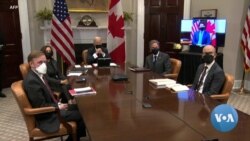The White House used a summit Thursday with the leaders of Canada and Mexico to discuss solutions to problems that affect all of North America – and beyond.
“The leaders pledged to take concrete actions in support of our joint goals, to include: ending the COVID-19 pandemic and advancing global health; fostering competitiveness and creating the conditions for equitable growth, and coordinating a regional response to migration,” the White House said late Thursday, after the summit ended after about three hours.
President Joe Biden met separately with Canadian Prime Minister Justin Trudeau, and with Mexican President Andrés Manuel López Obrador, before the three convened together for their first trilateral summit in five years.
Trudeau and López Obrador also met separately with Vice President Kamala Harris. The White House said Harris and López Obrador discussed issues including security, the economy, the pandemic and cooperation on space exploration. They also agreed to work “to address the root causes of migration from Central America and the need for a regional approach to migration in the Western Hemisphere.”
For Harris and Trudeau, discussions spanned the globe – the pair discussed Afghan refugee resettlement and unrest in Haiti and Ethiopia.
Trudeau, in brief comments, said the talks would prioritize pandemic recovery. Before the summit, Trudeau said he would push back against Biden’s Buy American program, which Ottawa sees as protectionist. He underscored that Canadian workers should not be left out of any North American economic initiatives.
“We're making sure that our integrated North American economy produces good jobs and supports the middle class in our three countries,” he said. “This will be underpinned by a world-class trade agreement that protects workers' rights.”
López Obrador framed economic progress as another way of countering China, which the U.S. sees as its main adversary.
“Economic integration, in full respect for our sovereignty, is the best instrument to face the competition stemmed from growth in other regions of the world, especially the productive and commercial expansion of China,” he said, speaking through a translator.
Biden, who is pushing a $1.75 trillion social spending bill that he believes will radically improve the lives of working-class Americans, emphasized his belief that equity should be at the center of economic growth.
"We're driving inclusive economic recovery together as two nations and meeting the climate crisis and standing up for democratic values,” Biden said, sitting with Trudeau in the Oval Office. “And I think we both think we're at our best when opportunity, equity and justice all coincide, and they're core values of Canadians and the United States. So this is one of the easiest relationships you can have as an American president, one of the best."
WATCH: Biden hosting leaders of Canada and Mexico
With López Obrador, Biden emphasized that the United States and Mexico are on equal footing.
“Mr. President, we no longer use language like ‘our friends from the south,’” Biden said. “You are an equal. We are equal countries.”
Challenges include migration, Cuba, competition
The three also faced rocky terrain.
After taking office, Biden halted the Trump-era Migrant Protection Protocol, known as the “Remain in Mexico” program, but Texas and Missouri successfully sued the federal government to have it restarted. That is likely to happen in coming weeks.
“The feeling of the United States that Mexico is not doing enough on security, I think will be a possible point of tension as well,” said Ryan Berg, a senior fellow in the Americas Program at the Center for Strategic and International Studies. “Surely the leaders will discuss the Remain in Mexico program, the fact that Title 42, as well, is still on the books, the migratory flows, as well as how Mexico can help the United States in the Northern Triangle countries.”
On migration, the triad agreed to a range of interventions, including a regional compact on migration for the Americas, and programs and funding that would create jobs in Latin America and the Caribbean -- thus reducing the appeal of economic migration. The group also said each country is “expected to make new commitments to take in more refugees.”
Beyond the borders
The three leaders were expected to discuss issues outside of their borders, such as recent protests in Cuba and the U.S.-led economic blockade on the island, over which Biden and López Obrador disagree.
They were also expected to discuss what Biden has described as a “sham” election in Nicaragua that saw longtime leader Daniel Ortega jail opponents and brutally repress dissent to take a fourth consecutive term in the Central American nation.
“I would assume that other critical issues across the hemisphere will be on the agenda as well,” said Jason Marczak, senior director of the Atlantic Council's Adrienne Arsht Latin America Center. ”Very concerned about what was seen just recently in Nicaragua with Daniel Ortega ... imprisoning political prisoners, leading to a sham vote in Nicaragua just recently.”
Both men alluded to that in their opening remarks, though the leaders did not commit to anything specific on this issue.
“I know we both are committed to making sure our democracies deliver for our people,” said Biden. “Democracies in the last 20 years have actually shrunk.”
López Obrador praised America's 32nd president, Franklin D. Roosevelt, for his emphasis on freedom, including “his concept of his four freedoms or liberties: the freedom of the manifestation of ideas or freedom of expression, the freedom of religion, and two very important ones, with the liberty for living free from fear and free from misery.”






